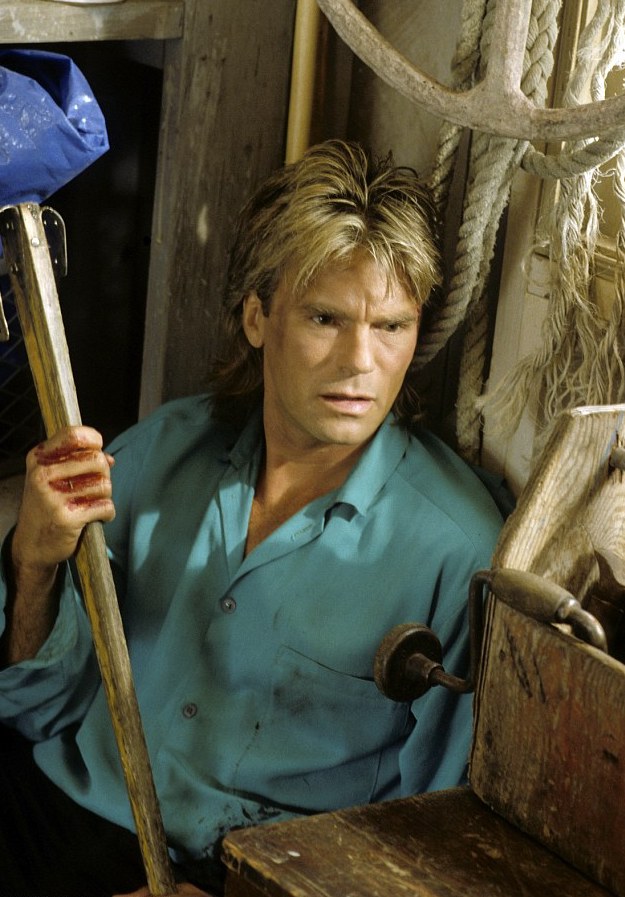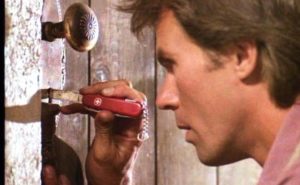I’ve been rewatching old episodes of MacGyver on Hulu as I wrapped Christmas gifts. They’re just as thrilling as when I was a kid.
OK, fine, they’re often dopey. They are also in 4×3 and paced really slowly by today’s standards. But for heaven’s sake, each episode is a nitrous boost of charm and commonplace creativity.

Richard Dean Anderson played secret agent Angus MacGyver, a troubleshooter for the fictional Phoenix Foundation and an agent for the Department of External Services (DXS), a fictional United States government agency.
MacGyver was educated as a physicist and served in the Army Special Forces as a Bomb Team Specialist during the Vietnam War. The character was resourceful, possessing a Wikipedia-like knowledge of the physical sciences that he used every episode to solve complex problems by making things out of ordinary objects like paper clips and chewing gum.
Often in life-or-death situations, MacGyver would need to improvise clever solutions on the fly. The show was praised for generating interest in the applied sciences and engineering, and it swept through culture to the point that it became a verb. His feats have come to be known as “MacGyvering” or “MacGyverisms.”
Interestingly, all of MacGyver’s exploits on the show were vetted by consulting scientists to ensure a basis on scientific principles. Though the writers acknowledged they were of course dramatized for television and you’d have to be extraordinarily lucky for most of MacGyver’s ideas to succeed.
Before Life Hack memes tripped through Facebook, there was MacGyver with his ever-present Swiss Army knife and duct tape. But, notably, in the few cases where MacGyver used household chemicals to mix up poisons or explosives, essential components were altered, omitted, or left vague so they would not be accurately described to the viewing public.
Most notably, MacGyver always employed non-violent resolutions and didn’t use a gun. Apart from a couple of lapses, he never even handled a gun, and any firearm he took from a bad guy would be thrown to the side or repurposed for other, less violent uses such as creating a diversion. For a culture awash in gun violence, this makes MacGyver novel, and I would say, necessary.
Everyone wanted to see what MacGyver might come up with. Once a companion asked, “What are you gonna do now, make a bomb out of a chewing gum wrapper?” MacGyver stopped and said “Why, you got one?”, a winking nod to what viewers often thought.

During one episode, Mac was buried in an avalanche. Facing the danger of suffocation and hypothermia, writers came up with a clever way to put time pressure on him beyond the usual story beats of ticking bombs or pursuing thugs. He was also limited to what he was carrying on his person rather than what he could find in a room, and being buried under snow, he could barely move, which made the whole thing feel crazy claustrophobic.
Mac also once escaped a prison camp by building a two-man ultralight out of bamboo, garbage bags, and a generator. The show was obviously not a documentary. Yet there is a reason these gimmicks remain as charming today as they did when the show first aired: As silly as they are in practice, most of the ideas had a general basis in scientific fact, and that pure love of knowledge elevated MacGyver above most of his violence-crazed peers.
What’s more, there wasn’t an ounce of cynicism on MacGyver. Nor was their any moral ambiguity. MacGyver was good. He did the right thing. He won in the end. He didn’t use guns.
The other nerds at Nerds on Earth will make fun of me for this. They love their anti-heroes. Give them their Deadpools and their Punishers.
Me? I’ll take MacGyver every time.
The show wouldn’t have worked without Richard Dean Anderson. A Minnesota native, Anderson was on track to become a hockey player before a knee injury derailed his athletic career. That explains the hair.
As an actor, he came across as a kind of guy-next-door Indiana Jones. MacGyver could have been an insufferable “um, actually” know-it-all who constantly needed to show off his scientific acumen. But Anderson played everything in the earnest “Gosh, I hope this works!” kind of way that made the convenient nature of the gadgets part of the charm of the show.
Sure, the show could be sluggish, have hokey exposition, forced humor, laughably earnest melodrama, and plot holes big enough to drive a panda through, but, gah, everybody knows you don’t “drive” pandas.
Yeah, it was dopey. But Henry Winkler was the producer, so you’d be correctamundo in thinking the show was cool. Were some of MacGyver’s stunts jump-the-shark moments? Maybe. But mock the nostalgia of MacGyver at your peril, because at the end of the day, Fonzie jumped over a shark on water skis and you didn’t.

With a pure heart, it’s not difficult to shift standards and appreciate MacGyver for what it accomplished. Revisiting MacGyver is still worthwhile, as the charm of the show holds up. Personally, the show’s anti-gun stance remains one of my favorite aspects. MacGyver was always portrayed as a man’s man, yet he refused to be violent. His superpower was his brain. That’s revolutionary, even today.
MacGyver was my favorite TV show as a kid. And, surely, it deserves some sort of special award for making science seem cool.
I asked for a Swiss Army Knife for Christmas three years running and I carried a roll of duct tape in my backpack. MacGyver inspired me to endeavor in scientific experimentation. Thankfully, my mom recognized my geekiness and supported my love of MacGyver, even to the point of taking it easy on me when I rewired an alarm clock and inadvertently caught the house on fire. Sorry, mom.
Sure, this is a nostalgia piece. You caught us: Nerds on Earth might not be keeping up with the cool kids, but we have our finger on the important pulses. And the United States is the cultural, diplomatic, and moral leader of the world in terms of investment in science. Right?
No? Well, then we need more heroes like MacGyver. Now, more than ever, we need to acknowledge scientists as heroes so we can raise up the next generation of MacGyvers.

